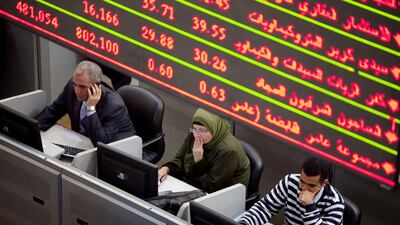Egypt has made progress on economic reforms backed by the International Monetary Fund, but its central bank must maintain a tight monetary policy to address inflation risks stemming from hikes in fuel and electricity prices, the IMF said.
The near-term growth outlook of the most populous Arab country is “favourable”, driven by a recovery in the tourism sector and rising natural gas production, the fund said.
“The economic situation has continued to improve during 2018,” said David Lipton, the IMF’s first deputy managing director and acting chair. “Strong programme implementation and generally positive performance has been instrumental in achieving macroeconomic stabilisation.”
The IMF observations follow Egypt's central bank decision to keep its benchmark rates unchanged on the back of inflation risks after the government introduced a new round of subsidy cuts in June. The reforms are part of a three-year programme of economic measures to secure a $12 billion IMF loan. Last week the fund approved the disbursement of a fourth tranche of the loan package, bringing the total amount released so far to more than $8bn.
Cairo's implementation of fiscal and economic reforms has led to narrowing of budget deficit, a reduction in unemployment and inflation, and accelerated growth, the IMF said. Its current account deficit is expected to remain below 3 per cent of gross domestic product and the public debt ratio to decline “markedly” by 2023.
Egypt’s “healthy” levels of foreign reserves and flexible exchange rate means it will be able to withstand “tightening global financial conditions” as investors pull back from emerging markets, the IMF noted.
“This reinforces the importance of a sound macroeconomic framework and consistent policy implementation,” Mr Lipton said.
Private-sector growth will be “essential” in providing jobs as the labour force is expected to swell over the next five year, the fund said.
_______________
Read more:
IMF approves Egypt's latest $2.75bn loan instalment
Egypt may stop LNG tenders as it prepares for exports next year
_______________
The reform agenda will address key hurdles to private sector development including enhancing transparency in allocating industrial land, improving competition and public procurement, improve accountability of state-owned businesses and tackle corruption.
Egypt’s non-oil sector private economic activity picked up slightly in June to 49.4 from 49.2 in May, according to a separate Emirates NBD Egypt Purchasing Managers' Index report, released on Tuesday.
However, the monthly figure is still below 50 baseline - a reading above or below that level indicates economic expansion or contraction, respectively - due to a reduction in output and new orders, the survey indicated.
Output fell due to weaker demand, leading to a contraction in business activity, which affected new orders that coincided with lower levels of new export business.
The private sector “continues to lag” as costs were pressured by inflation, Daniel Richards, the Middle East and North Africa economist at Emirates NBD, said.
“The failure to consistently post above the 50 mark reflects the fact that Egypt’s economic recovery has to now been achieved, primarily through external rebalancing and government investment.”
However, Egyptian businesses remained confident that output will grow over the remainder of the year and optimism increased in June from a month ago on expectations of new investments and contracts.
The business optimism is in line with findings of a survey of 100 top-level executives in the country from across sectors from mid-2017 to early 2018 on business confidence, conducted by the Oxford Business Group.
More than 90 per cent of the respondents said they have positive or very positive expectations of local business conditions in the next 12 months, according to the survey. This is up from 79 per cent in a survey released early in 2017.


